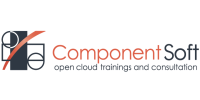Additional information
| Prerequisites | Proficiency with the Linux CLI. A broad understanding of Linux system administration.
|
|---|---|
| Difficulty level | |
| Duration | 5 days |
| Certificate | The participants will obtain certificates signed by Component Soft (course completion). |
| Trainer | Authorized Component Soft Trainer. |
Other training Component Soft | Cloud-Native (Kubernetes)
-

KBS-052 Cloud Native Intro for IT and Telco Managers and Professionals training Component Soft
-

DCK-101 Docker Intro training Component Soft
-

IST-102 Service Mesh Essentials and Implementation with Istio training Component Soft
-

CEPH-151 Kubernetes Storage Administration with Ceph and Rook training Component Soft
-

KBS-103 Kubernetes administration and CKA exam.prep. training Component Soft
-

KBS-302 Kubernetes and Container-based Application Security with CKS exam.prep. training Component Soft
-

KBS-322 Container and Kubernetes networking deep dive training Component Soft
-

KBS-343 Kubernetes Troubleshooting training Component Soft
-

KBS-535 Kubernetes admin & K8s and Container-based Application Security with exam.prep. training Component Soft
-

KBS-615 Kubernetes Networking deep dive and Troubleshooting training Component Soft
Cloud and DevOps
Citrix Virtual Apps and Desktops | Citrix
-

CVAD-201 Citrix Virtual Apps and Desktops Administration training Citrix
-

CVAD-301 Citrix Virtual Apps and Desktops Advanced Administration training Citrix
-

CWS-255 Citrix DaaS Deployment and Administration training Citrix
-

CWS-415 Citrix Virtual Apps and Desktops 7 Architect Design Solutions training Citrix
Cloud-Native (Kubernetes) | Component Soft
-

KBS-052 Cloud Native Intro for IT and Telco Managers and Professionals training Component Soft
-

DCK-101 Docker Intro training Component Soft
-

IST-102 Service Mesh Essentials and Implementation with Istio training Component Soft
-

CEPH-151 Kubernetes Storage Administration with Ceph and Rook training Component Soft
-

KBS-103 Kubernetes administration and CKA exam.prep. training Component Soft
-

KBS-302 Kubernetes and Container-based Application Security with CKS exam.prep. training Component Soft
-

KBS-322 Container and Kubernetes networking deep dive training Component Soft
-

KBS-343 Kubernetes Troubleshooting training Component Soft
-

KBS-535 Kubernetes admin & K8s and Container-based Application Security with exam.prep. training Component Soft
-

KBS-615 Kubernetes Networking deep dive and Troubleshooting training Component Soft
Foundations | Google Cloud
-
recommended training

Google Cloud Fundamentals: Core Infrastructure training Google Cloud
2026-03-13 | Virtual Classroom sign up -

Getting Started with Google Kubernetes Engine training Google Cloud
-

Getting Started with Terraform for Google Cloud training Google Cloud
Azure | Microsoft
-

AZ-900T00 Microsoft Azure Fundamentals training Microsoft
-

Azure Administrator Bootcamp training Microsoft
-

AZ-305T00 Designing Microsoft Azure Infrastructure Solutions training Microsoft
-

AZ-104T00 Microsoft Azure Administrator training Microsoft
-

AZ-120T00 Planning and Administering Microsoft Azure for SAP Workloads training Microsoft
-

AZ-140T00 Configuring and Operating Microsoft Azure Virtual Desktop training Microsoft
-

AZ-600T00 Configuring and Operating a Hybrid Cloud with Microsoft Azure Stack Hub training Microsoft
-

WS-012T00 Windows Server 2019 Hybrid and Azure IaaS training Microsoft
Data Platform | Microsoft
-
recommended training

DP-900T00 Microsoft Azure Data Fundamentals training Microsoft
-

DP-080T00 Querying Data with Microsoft Transact-SQL training Microsoft
-

DP-090T00 Implemeting a Machine Learning Solution with Microsoft Azure Databricks training Microsoft
-

DP-100T01 Designing and Implementing a Data Science Solution on Azure training Microsoft
-

DP-203T00 Data Engineering on Microsoft Azure training Microsoft
-

DP-300T00 Administering Microsoft Azure SQL Solutions training Microsoft
-

DP-420T00 Designing and Implementing Cloud-Native Applications Using Microsoft Azure Cosmos DB training Microsoft
E-learning | The Linux Foundation
-

LFS260 Kubernetes Security Essentials training The Linux Foundation
-

LFD259 Kubernetes for Developers training The Linux Foundation
-

LFS244 Managing Kubernetes Applications with Helm training The Linux Foundation
-

LFS250 Kubernetes and Cloud Native Essentials training The Linux Foundation
-

LFS253 Containers Fundamentals training The Linux Foundation
-

LFS258 Kubernetes Fundamentals training The Linux Foundation
-

LFS261 DevOps and SRE Fundamentals: Implementing Continuous Delivery training The Linux Foundation
-

LFS262 Implementing DevSecOps training The Linux Foundation
-

LFS266 DevOps for Network Engineers training The Linux Foundation
-

LFS269 GitOps: Continuous Delivery on Kubernetes with Flux training The Linux Foundation
Exam | The Linux Foundation
-

CKA Certified Kubernetes Administrator training The Linux Foundation
-

KCNA Kubernetes and Cloud Native Associate training The Linux Foundation
-

CKA Certified Kubernetes Administrator + CKS Certified Kubernetes Security Specialist Exam Bundle training The Linux Foundation
-

CKAD Certified Kubernetes Application Developer training The Linux Foundation
-

CKS Certified Kubernetes Security Specialist training The Linux Foundation
-

FOCP FinOps Certified Practitioner training The Linux Foundation
-

JSNAD OpenJS Node.js Application Developer training The Linux Foundation
-

JSNSD OpenJS Node.js Services Developer training The Linux Foundation
Bundle (e-learning + exam) | The Linux Foundation
-

LFD259 Kubernetes for Developers + CKAD Exam Bundle training The Linux Foundation
-

LFS250 Kubernetes and Cloud Native Essentials + KCNA Exam Bundle training The Linux Foundation
-

LFS258 Kubernetes Fundamentals + CKA Exam Bundle training The Linux Foundation
-

LFS260 Kubernetes Security Essentials + CKS Exam Bundle training The Linux Foundation
Upcoming Component Soft training
-
2026-03-10 Kraków / Virtual Classroom
KBS-103 Kubernetes administration and CKA exam.prep.
hybrid training: HYBRID -
2026-03-16 Warszawa / Virtual Classroom
KBS-105 Docker Intro + Kubernetes & Helm Admin with CKA & CKAD exam.prep.
hybrid training: HYBRID -
2026-03-23 Kraków / Virtual Classroom
KBS-105 Docker Intro + Kubernetes & Helm Admin with CKA & CKAD exam.prep.
hybrid training: HYBRID -
2026-03-23 Warszawa / Virtual Classroom
KBS-322 Container and Kubernetes networking deep dive
hybrid training: HYBRID -
2026-03-24 Warszawa / Virtual Classroom
AI-434 GenAI Application Development with LLMs (OpenAI GPT, Google Gemini, Meta Llama, Mistral)
hybrid training: HYBRID -
2026-03-30 Kraków / Virtual Classroom
KBS-322 Container and Kubernetes networking deep dive
hybrid training: HYBRID -
2026-03-31 Kraków / Virtual Classroom
AI-434 GenAI Application Development with LLMs (OpenAI GPT, Google Gemini, Meta Llama, Mistral)
hybrid training: HYBRID -
2026-04-14 Warszawa / Virtual Classroom
KBS-103 Kubernetes administration and CKA exam.prep.
hybrid training: HYBRID -
2026-04-27 Warszawa / Virtual Classroom
AI-434 GenAI Application Development with LLMs (OpenAI GPT, Google Gemini, Meta Llama, Mistral)
hybrid training: HYBRID -
2026-05-12 Kraków / Virtual Classroom
KBS-103 Kubernetes administration and CKA exam.prep.
hybrid training: HYBRID
Component Soft


